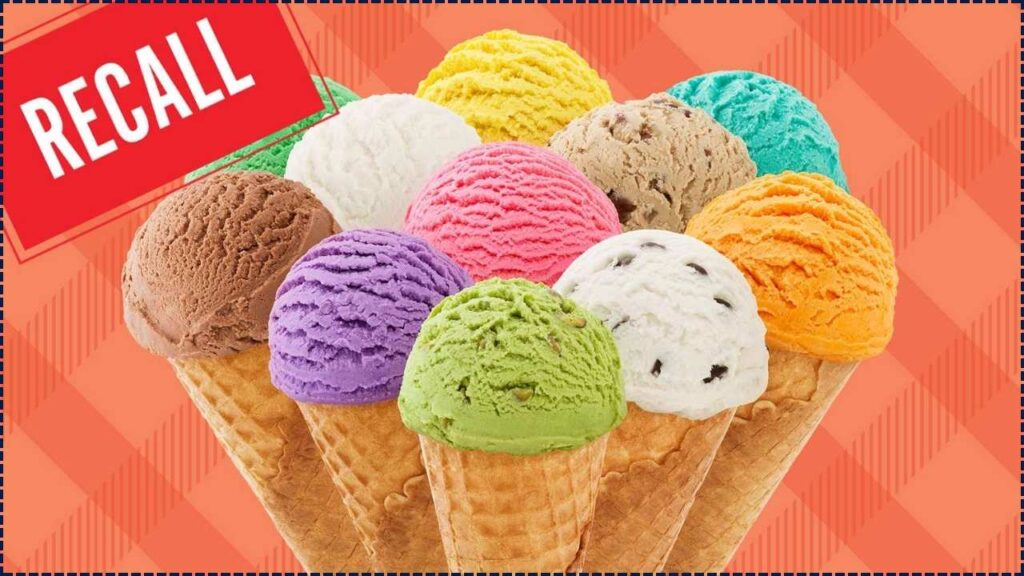A nationwide ice cream recall has been issued due to potential contamination with Listeria monocytogenes, a bacteria known to cause serious health risks, especially for pregnant women, the elderly, and individuals with weakened immune systems. Over 100,000 ice cream products have been affected by this recall, which involves popular brands that are sold in grocery stores and used in various food service establishments across the United States.

This article will provide a detailed breakdown of the recall, why Listeria is a threat, the products involved, and what consumers need to do to protect themselves. With the busy summer months ahead and ice cream being a staple dessert, it is important to stay informed to avoid potential contamination.
Nationwide Ice Cream Recall Issued
| Key Data & Stats | Details |
|---|---|
| Reason for Recall | Listeria monocytogenes contamination found in affected ice cream products. |
| Product Names | Chocolate Crunch Cake Bar, Strawberry Shortcake Bar, Rich Bar, Crumbled Cookie Bar, Orange Cream Bar, Fudge Frenzy Bar, and more. |
| Brands Affected | Friendly’s, Hershey’s Ice Cream, Jeni’s Splendid Ice Creams, Yelloh!, Chipwich, and others. |
| FDA Classification | Class II recall – products present a medically reversible health risk. |
| States Affected | Nationwide across 23 states, including California, Florida, New York, Texas, and others. |
| Health Risks | Listeria infection can cause fever, nausea, and muscle aches, posing serious risks to pregnant women, the elderly, and those with compromised immune systems. |
| Action for Consumers | Consumers should check their freezers and either dispose of or return recalled products to the store. |
| FDA Contact Information | For more information, consumers can contact the FDA at 1-888-INFO-FDA. |
The ice cream recall due to Listeria contamination serves as an urgent reminder of the importance of food safety, especially for vulnerable groups. If you have purchased affected products, take immediate action to protect your health by checking your freezer, disposing of or returning the products, and monitoring your health for any symptoms of Listeria infection. Staying informed and practicing good food safety habits will help you avoid potential risks associated with contaminated food products.

What Is Listeria and Why Is It a Concern?
What Is Listeria monocytogenes?
Listeria monocytogenes is a bacterium that causes listeriosis, a serious infection that can have severe health consequences, especially for vulnerable populations. Healthy individuals may experience mild symptoms such as fever, muscle aches, gastrointestinal issues, and sometimes diarrhea. However, the infection can be much more dangerous for pregnant women, newborns, the elderly, and individuals with weakened immune systems, such as those undergoing chemotherapy or living with chronic diseases like diabetes or HIV.
The infection can lead to serious complications such as miscarriage, stillbirth, meningitis, or blood infections. Since Listeria bacteria can thrive even in cold, refrigerated environments, ready-to-eat foods like ice cream are at risk of contamination if not properly handled during production and storage.
Why Ice Cream?
Ice cream is particularly susceptible to Listeria contamination because it’s often produced, distributed, and stored under refrigerated conditions where the bacteria can still grow. While refrigeration can slow bacterial growth, it doesn’t stop it completely, which is why Listeria can survive in frozen treats. Though it’s rare, Listeria can still thrive in the ice cream and remain a threat if not handled correctly.
Affected Brands and Products
The FDA has listed several popular brands affected by this recall. These include widely recognized names that many households turn to for a sweet treat. The recalled products cover a wide range of ice cream flavors and forms, including bars, cones, cakes, and more.
- Friendly’s Ice Cream
- Recalled Products: Chocolate Crunch Cake Bar, Strawberry Shortcake Bar, and other frozen dessert cakes.
- Affected Flavors: Chocolate, Strawberry, and Vanilla.
- Hershey’s Ice Cream
- Recalled Products: Vanilla and Chocolate Flavored Ice Cream Cake, Cookies & Cream Ice Cream Cones.
- Affected Sizes: Various sizes of prepackaged cakes and cones.
- Jeni’s Splendid Ice Creams
- Recalled Products: Ice Cream Sandwiches in various flavors including chocolate and vanilla.
- Affected Sizes: Sold in smaller to family-sized portions.
- Yelloh!
- Recalled Products: Sundae Cones in Vanilla Nut and Pecan Praline flavors.
- Affected Sizes: Single-serve cones.
- Chipwich
- Recalled Products: Ice Cream Sandwiches available in different flavors.
- Affected Sizes: Standard retail packaging.
- Additional Affected Brands
Smaller producers like Cumberland Farms, The Frozen Farmer, and Marco Ice Cream Sandwiches have also been included in the recall list. For a complete list of all affected products, visit the FDA website.
What Should Consumers Do?
If you’ve purchased any of the affected products, it’s crucial to take immediate action to protect your health and safety. Follow these simple steps:
1. Check Product Labels and UPC Codes
- Check the packaging for the product names, UPC codes, and lot numbers mentioned in the FDA’s recall notice. If you are unsure whether your product is affected, refer to the FDA recall page for a detailed list of affected items.
2. Dispose or Return Recalled Products
- Do not consume the affected ice cream products. Even if the product seems fine, Listeria contamination is invisible and not detectable by taste or smell.
- Dispose of the affected products in a way that ensures no one else consumes them, or return them to the store where you purchased them for a full refund.
3. Monitor Your Health
- If you’ve consumed the recalled ice cream, monitor for symptoms of Listeria infection. This includes fever, nausea, muscle aches, stiff neck, and abdominal pain.
- Pregnant women, the elderly, and those with compromised immune systems should seek medical attention immediately if they experience any symptoms. For others, it’s still important to contact your healthcare provider if symptoms persist or worsen.
4. Stay Informed and Report Symptoms
- For further inquiries, contact the FDA at 1-888-INFO-FDA.
- Stay informed on food safety issues by checking the FDA website and subscribing to food recall alerts. The FDA regularly updates its recalls and alerts section to keep the public informed.
Related Links
Get Early Retirees Off the Golf Course? Why the UK Wants Them Back at Work Fast
Want Bigger Social Security Checks? Here Are 3 Smart Ways to Delay and Maximize Your Benefits
FDA Issues Highest-Risk Warning Over Cheeseburger Recall — Check Your Freezer Now
Preventing Listeria Infection: Tips for Safe Food Handling
While the recall highlights the risks of consuming contaminated ice cream, it’s important to follow these general food safety practices to minimize the risk of any foodborne illnesses, including Listeria:
1. Keep Your Freezer Clean
- Always keep your freezer at a proper temperature of 0°F or -18°C. Clean your freezer regularly to avoid contamination from spills or melted food.
2. Wash Your Hands and Surfaces
- Wash your hands before and after handling food, especially after handling raw products. Use warm water and soap for at least 20 seconds.
- Clean surfaces like countertops, cutting boards, and utensils regularly to prevent cross-contamination.
3. Store Ice Cream Properly
- Make sure that ice cream is always stored at the right temperature and sealed tightly to prevent contamination. It should be consumed before the expiration date listed on the packaging.
4. Be Cautious of Ready-to-Eat Foods
- Pay attention to food safety guidelines when consuming ready-to-eat foods such as deli meats, soft cheeses, and frozen desserts. These are more prone to contamination and should always be handled with care.
FAQs
Q1: How can I check if my ice cream is part of the recall?
A1: You can verify whether your ice cream is affected by checking the product names, UPC codes, and lot numbers listed in the FDA’s recall notice.
Q2: What are the symptoms of Listeria infection?
A2: Symptoms include fever, muscle aches, nausea, diarrhea, and sometimes stiff neck or headache. Pregnant women and elderly individuals should seek medical attention immediately.
Q3: What should I do if I’ve already eaten the recalled ice cream?
A3: If you’ve consumed the recalled ice cream, monitor for symptoms and consult your healthcare provider, especially if you are pregnant, elderly, or immunocompromised.
Q4: How serious is Listeria infection?
A4: Listeria can be life-threatening, especially for high-risk individuals, and can cause miscarriage, stillbirth, and serious infections in newborns and the elderly.





